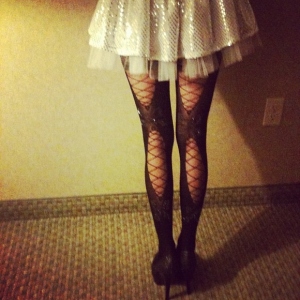[unrelated author’s note: my cat, Elsa, has eaten 1-2 feet of yarn sometime early this morning, so I spent the last few hours at the vet. My hope is that she chewed it up into sections so it could pass safely– if not, we’re facing some pretty steep costs for emergency surgery. Posts may be a little sporadic over the next few weeks as I’m watching her like a hawk now, and might be taking care of a recovering kitten next week. Positive thoughts and prayers appreciated.]
Up until this point while I was reading Captivating, I was staying pretty optimistic. John and Stasi were saying some problematic things, some things I disagree with, but there were things happening to balance some of them out.
This is where my marginalia changes from “I wonder if they’ve thought about ____” to “GAH” and “WTF. NO, SERIOUSLY, WTF JOHN.”
I start off this section essentially agreeing with John; he spends the first few pages talking about beauty in general terms, in nature, as part of God’s creativity, and as something that feeds the human soul– beauty, according to his argument, is a vital part of all God’s creations. As someone who grew up in a hideously ugly fundamentalist church that started going to liturgical Presbyterian and Episcopalian services almost entirely because the beauty of those churches took my breath away, I agree that American evangelical culture has a tendency to overlook beauty as inconsequential and supercilious instead of something that feeds a soul craving. But then . . .
But in order to make the matter perfectly clear, God has given us Eve. The crowning touch of creation. Beauty is the essence of a woman. We want to be perfectly clear that we mean both a physical beauty and a soulful/spiritual beauty. The one depends upon and flows out of the other. Yes, the world cheapens and prostitutes beauty, making it all about a perfect figure few women can attain. But Christians minimize it, too, or overspiritualize it, making it all about “character.” We must recover the prize of Beauty. The church must take it back. Beauty is too vital to use.
Long, dramatic sigh.
This note is a bit of an aside, but I don’t like how he uses the word prostitute here. I’ve learned a lot from listening to sex workers of all types, and I’ve learned how important it is to listen to these people instead of talking over them and assuming we know more about their lives then they do.
But moving on: Beauty is the essence of a woman.
I… am having difficult responding to that. I understand where John is trying to go with this argument, but the reality he’s trying to ignore is that words mean things, and when you say something like “beauty is the essence of a woman,” you can’t escape how a very specific definition of beauty has been ingrained into Americans practically since birth. When he says this, he is also saying thinness is essential to a woman, and so is whiteness, and so is subjectively large breasts and clear skin and red lips. I’m positive John and Stasi would never openly endorse these sentiments, but they do absolutely nothing to recognize these shortcomings in using a phrase like “physical beauty.”
He goes on to support this by showcasing how Western art has supposedly chosen the cisgender female form to represent beauty. I’d ask how familiar John is with the Renaissance, but the most irritating part of page 37 is that John goes to Santa Fe, sees women represented in art, and uses this to support his conclusion that beauty is essential to womanhood. I don’t think it would have ever occurred to him to ask the question why he might have seen women overwhelmingly represented; aside from how women are sexual objects in our culture, there’s also a lot of homophobia spinning around, even in the “liberated” art world– anything that might appear homoerotic (which is basically anything that doesn’t center the straight male gaze, and ignores the existence of bisexual and lesbian women) makes some people uncomfortable. Ergo, using the cisgender male form to represent beauty isn’t going to happen that often.
There’s a bit of that homophobia happening here:
For one thing, men look ridiculous lying on a bed buck naked, half-covered with a sheet. It doesn’t fit the essence of masculinity. Something in you wants to say, “Get up already and get a job. Cut the grass. Get to work.”
Two things: John needs to get out more. Go look at the Sistine Chapel ceiling, maybe. And when I see my partner lying on a bed buck-naked, half-covered with a sheet, I am most definitely not thinking “Go cut the grass you look ridiculous.”
Second: John can’t get away from how our culture identifies beauty. Women are portrayed as passive, and that is part of what makes them “beautiful.” They are depicted as languid, as restful, as reclining, and ultimately, as receptacles. Portraying women as “doers” would acknowledge that we actually are capable of action, and that would upset the gender narrative. He even already knows this:
[A woman at rest] is enjoyable to be with. She is lovely. In her presence your heart stops holding its breath. You relax and believe once again that all will be well. And this is also why a woman who is striving is so disturbing. (emphasis added)
However, John blatantly insists that “There is no agenda here; no social stigmatizing or cultural pressure. This is true across all cultures and down through time.”
Really. All cultures through all time. No exceptions. Ever.
And then he just really takes the Samantha-has-no-time-for-this cake.
There’s a touching story told from the hospitals of WWII, where a young and badly wounded soldier was brought in from a hellish week of fighting. After doing what she could for him, the nurse asked if there was anything else she could do. “Yes,” he said. “Could you just put on some lipstick while I watch?”
That was the second time I threw the book across the room. I started shouting, and it inspired a twitter rant.
That is sexual objectification.
That is the female body limited to male consumption and the male gaze.
Also, that soldier is creepy as ever-living fuck. And sexist. That John thinks of this story as “touching” is … horrifying. This is the moment when I could no longer mentally engage with John with respect. Not only is he ignorant, not only does he rely on confirmation bias out the whazoo, I cannot trust him to understand basic human interactions and what “creepy” and “sexist” looks like.
But, oh no, it doesn’t end with that. It gets worse.
One of the deepest ways a woman bears the image of God is in her mystery . . . God yearns to be known. But he wants to be sought after by those who would know him . . . There is a dignity here; God does not throw himself at any passerby. He is no harlot.
God dammit.
Shit.
Third time the book flew across the room. I almost hit my cat.
This isn’t just ignorance now, or confirmation bias, or not understanding sexism. This is him either not reading or completely ignoring huge portions of Scripture.
John 3:16 is in there. So is the Parable of the Lost Sheep. And “I am come to seek and to save.” And I dunno, the whole God is love part, and that bit seems mighty important.
Apparently that makes Jesus a slut.




